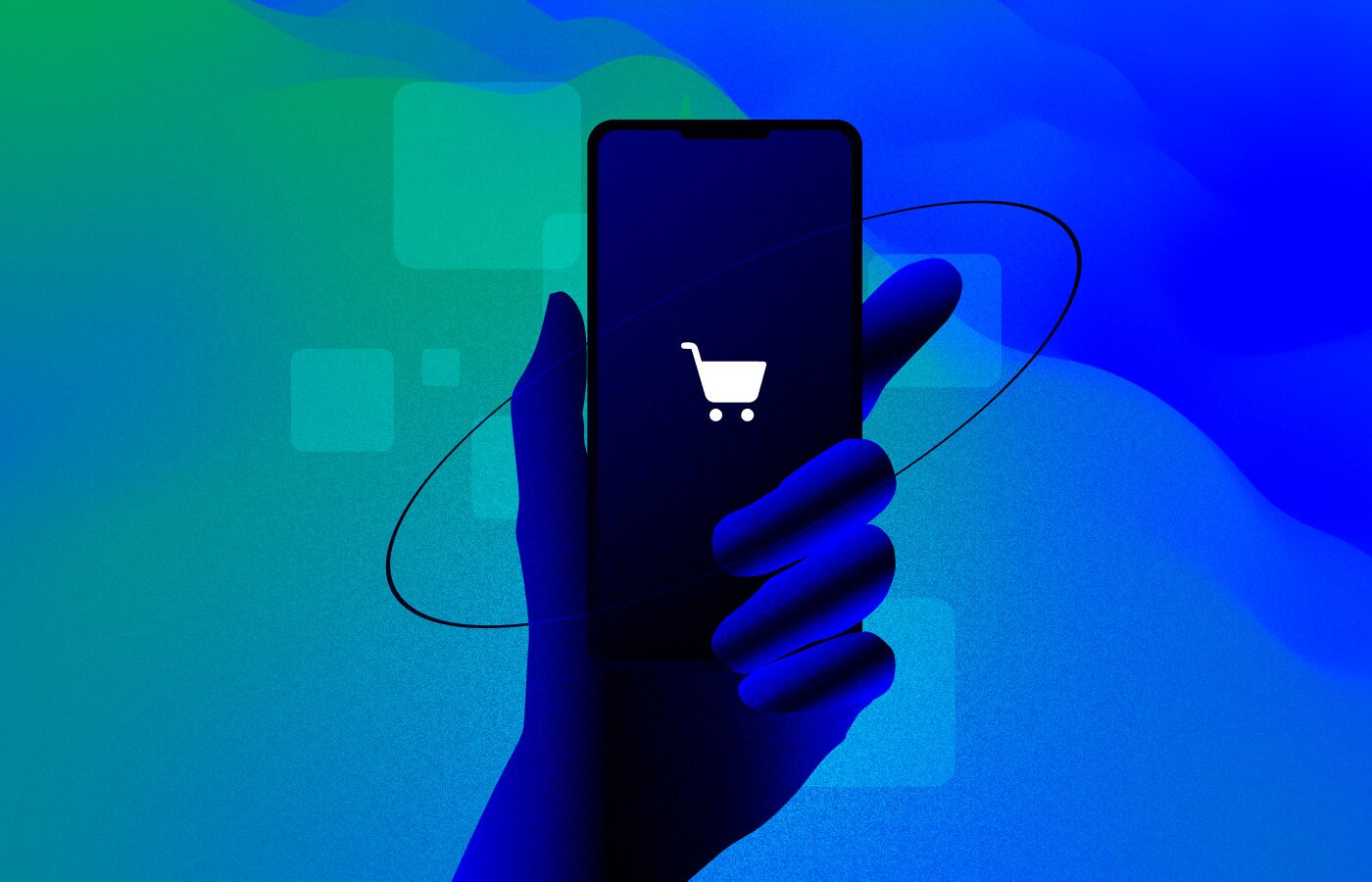blog
What Are the Top Features Your Ecommerce Mobile App Must have
By Mohan S App development Customer Experience July 4, 2023

More than 50% of all eCommerce transactions during the 2022 holiday season were conducted through smartphones.
Mobile commerce provides unparalleled accessibility with its customer facing apps, enabling customers to shop anytime and anywhere without being tied to a desktop computer. This freedom enables businesses to reach a larger audience and capture sales opportunities. Mobile apps offer a personalized shopping experience, utilizing features like push notifications, location-based services, and personalized recommendations. By tailoring the app experience to individual preferences and providing a user-friendly interface, businesses can increase customer satisfaction and loyalty.
Top Features Your Ecommerce App Must Have
Prioritizing the features that will improve the user experience, increase sales, and create a competitive advantage in the market is essential when creating an ecommerce app. An e-commerce app's success depends on its capacity to give users a seamless and enjoyable shopping experience.
Seamless User Registration and Authentication
Ecommerce app registration and login processes are crucial for user experience and customer acquisition. A smooth, hassle-free process encourages more users to sign up and engage with the app.
Enhanced User Experience: Simplifying the registration process by minimizing fields and providing social media login or email signup options are essential for user experience. Convenience and quick registration methods are preferred, leading to increased satisfaction and app exploration.
Social Media Integration: Social media login simplifies app sign-up, eliminating the need for new accounts and login credentials. By integrating with users' profiles, you can extract relevant information and personalize app experiences. This integration also allows users to easily share app activities or products, driving organic growth and brand visibility.
Building Trust and Security: Secure authentication measures are crucial for building trust and protecting user data in ecommerce. Implementing robust security measures like encryption, secure protocols, and strong password requirements ensures user privacy and safeguards sensitive information.
Intuitive Product Browsing and Search
Ecommerce app navigation provides seamless shopping experience, guiding customers to find desired products. Efficient search functionality enhances the user experience by allowing quick and easy product location. These features are crucial for a successful ecommerce experience.
Intuitive Navigation: A well-designed navigation system allows users to easily explore app sections, browse product categories, and access relevant information. Intuitive navigation reduces confusion, enhancing the user experience with clear menu structures, filters, and gestures.
Efficient Search Functionality: Ecommerce app's search function is crucial for users to find products based on preferences. Efficient search features include filters, sorting options, and auto-suggestions, enhancing the user experience. Filters refine search results based on price range, brand, size, color, and popularity, while sorting options arrange products based on relevance and price.
Increased Conversion Rates: Intuitive product browsing and search functionalities boost conversion rates by reducing friction, optimizing the shopping experience, and increasing visitor conversions by reducing barriers and improving user journey efficiency.
Robust Product Catalog
A robust product catalog is essential for ecommerce apps, as it presents products visually and influences user purchasing decisions. Key reasons include organization, visual appeal, and a user-friendly interface.
Visual Appeal and User Engagement: High-quality product images capture users' attention, create visually engaging experiences, and enhance purchasing decisions. Including zoom functionality and 360-degree views boosts engagement.
Detailed Product Descriptions: Product descriptions with clear, concise information, including key features, specifications, materials, dimensions, and usage instructions, help users evaluate and understand a product, while customer reviews and ratings enhance credibility and decision-making.
Product Variations and Options: Ecommerce apps offer diverse product options, requiring a user-friendly interface for easy selection and customization. Clear displays and switchable options enable users to find the perfect product.
Smooth Checkout Process
A smooth checkout process is crucial for minimizing cart abandonment and ensuring a positive user experience. It is the final decision-making stage, and any friction or complications can lead to lost sales. A smooth checkout process is significant.
Guest Checkout Option: A guest checkout option saves time and eliminates the need for account creation, capturing sales from customers who may be deterred by a mandatory process.
Saved Payment Options: Secure payment storage streamlines checkout for returning customers, allowing quick purchase completion without re-entry, increasing convenience and promoting repeat purchases.
Multiple Shipping Methods: Offering diverse shipping methods caters to customers' preferences and needs, ensuring transparency in the checkout process and meeting their diverse needs. Including costs and estimated delivery times ensures customer satisfaction.
Secure Payment Gateway Integration
Integrating secure payment gateways into your ecommerce app is crucial for smooth transactions and customer trust. This process builds trust, protects customer data, and provides a seamless payment experience. Prioritizing secure gateway integration is essential for maintaining customer data security and ensuring a secure payment experience.
Trust and Credibility: Integrating reputable payment gateways establishes trust and credibility with customers, ensuring confidence in providing credit card information and robust security measures.
Variety of Payment Options: Integrate multiple payment options into your app, including credit/debit cards, digital wallets, and bank transfers, to cater to diverse customer preferences and reduce barriers to purchase completion.
Encryption and Data Security: Data security is crucial in the payment process, ensuring encrypted gateways and industry standards, including SSL/TLS protocols, protect customer information and extend to both apps and backend systems.
Personalized User Experience
Personalization in ecommerce apps benefits both customers and businesses by tailoring recommendations, promotions, and user interfaces to individual users, resulting in an engaging and relevant shopping experience.
Improved Customer Engagement: Personalized recommendations based on user preferences, browsing history, and purchase behavior improve customer engagement by presenting relevant products, increasing click-through rates, and encouraging exploration of the product catalog.
Enhanced User Loyalty: Personalization boosts loyalty by understanding customer preferences, suggesting relevant products, and offering personalized incentives. This connection strengthens customer relationships, leading to repeat purchases, positive reviews, and app referrals, ultimately contributing to business growth.
Wishlists and Order History Tracking: Users can create wishlists and track their order history for convenience which enhances the shopping experience and customer satisfaction.
Data-Driven Insights: Personalization insights help analyze user preferences, behavior, and purchase patterns, enabling data-driven decisions and optimizing business operations.
Reliable Order Management
An efficient order management system is crucial for ecommerce app customers and sellers, ensuring a smooth process from order placement to delivery. Reliable order management systems are essential for efficient and successful transactions.
Efficient Order Processing: Efficient order management systems streamline incoming order processing, automating tasks like inventory, confirmation, and packaging, saving time and allowing sellers to focus on customer service and product sourcing.
Order Tracking and Delivery Updates: Order tracking enhances customer satisfaction by providing real-time updates on package location and estimated delivery time. Integration with carriers streamlines tracking, eliminating external websites and customer support.
Notifications and Communication: Timely and relevant notifications are essential for order management, ensuring customer engagement, updates, and promotions, while also promoting repeat purchases.
Easy Returns and Refunds: A smooth returns and refunds process is crucial for building trust with customers. An effective order management system should include self-service portals and automated refunds for timely reimbursements.
Social Sharing and Customer Reviews
Social sharing and customer reviews significantly impact trust, user engagement, and purchasing decisions in ecommerce apps. Integrating social media sharing and a platform for feedback and reviews can significantly impact a business.
Building Trust: Social sharing and customer reviews build trust among potential customers, as positive reviews validate product credibility and quality. Positive social sharing acts as social proof, increasing user engagement and purchase likelihood.
User-generated Content: Social sharing and customer reviews generate user-generated content (UGC) for marketing purposes, adding authenticity and credibility to your brand. Curating and featuring UGC on app websites, social media channels, and product pages showcases real experiences and product value, inspiring engagement and purchases.
Feedback and Improvement: Engaging customers through feedback and reviews offers valuable insights into experiences, preferences, and improvement areas. Actively listening and addressing concerns fosters connection, loyalty, and continuous improvement, ultimately enhancing the customer experience.
Analytics and Reporting
Data analytics is essential for understanding user behavior and improving ecommerce app performance. By tracking key metrics, generating reports, and implementing optimizations, valuable insights are gained, driving informed decision-making and achieving business goals.
Understanding User Behavior: Analytics helps understand user interactions, preferences, and product categories, enabling app design, content, and experience to meet target audience needs and expectations. Tracking metrics helps identify obstacles and improve the user experience.
Tracking Key Performance Metrics: Track key performance metrics to evaluate marketing strategies and app performance, revealing revenue generation, campaign success, and customer loyalty. This helps identify trends, set benchmarks, and measure the impact of changes or optimizations.
Generating Reports: Generating reports from analytics data offers a comprehensive app performance overview, identifying strengths, weaknesses, growth opportunities, evaluating marketing campaigns, setting realistic goals, and making informed business decisions.
Conclusion
A well-designed ecommerce mobile app should include user registration, authentication, intuitive product browsing, a robust catalog, a smooth checkout process, secure payment gateway integration, personalized user experiences, reliable order management, social sharing, customer reviews, and analytics.
These features enhance the user experience, build trust with customers, increase engagement, and drive conversions. By prioritizing user experience, security, convenience, and personalization, businesses can create a seamless shopping journey that attracts and retains customers. With the right features, an ecommerce mobile app can drive sales, build customer loyalty, and achieve business growth.






